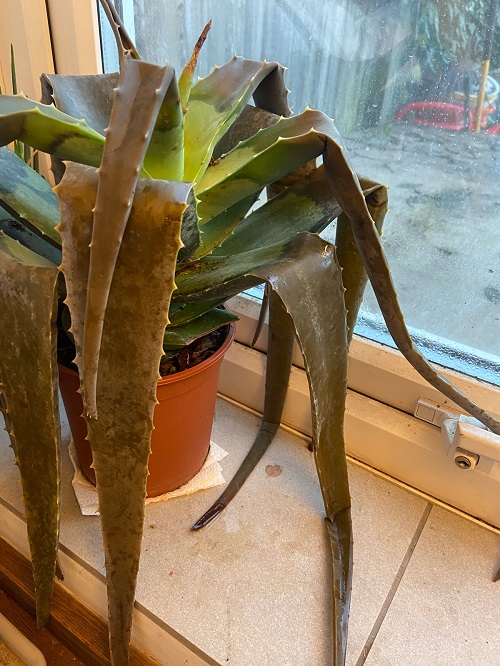Is your Aloe Plant Turning Brown? Worried about would could be the reasons? We have the solutions for you! Keep reading!
Aloe Plant Turning Brown? Not sure what could be the reason behind it? Join us as we provide the right tips and tricks on saving these plant from this misery!
Learn How Often Do You Water Aloe Vera Plants? here
Aloe Plant Turning Brown – Reasons and Solutions
1. Overwatering
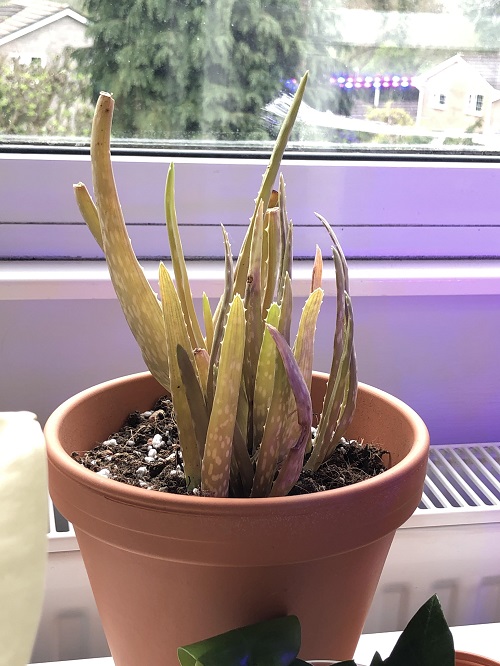
Excessive watering is one of the main reasons behind aloe plant turning brown and can lead to root rot and cause the leaves of the aloe plant to turn brown. Aloe plants are succulents and have low water requirements. Solutions include:
- Check the moisture level of the soil before watering. Only water when the top inch (2.5 cm) of soil is dry.
- Ensure the pot has proper drainage to prevent water from accumulating at the bottom.
- Adjust your watering schedule accordingly and reduce the frequency of watering.
2. Underwatering

Second reason behind aloe plant turning brown is too much moisture. While overwatering is common, under-watering can also cause aloe plants to turn brown. Insufficient water supply leads to dehydration and stress. Solutions include:
- Check the soil regularly to see if it has become too dry. Water thoroughly when the top inch (2.5 cm) of soil is dry.
- Increase the frequency of watering, especially during hot and dry periods.
- Ensure proper drainage to prevent excess water from sitting in the pot.
Check Venus Flytrap Turning Black – 10 Reasons and Solutions here
3. Sunburn
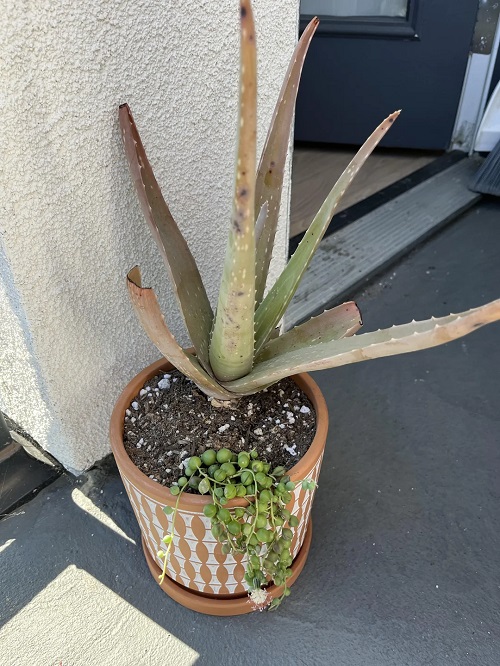
Third reason behind aloe plant turning brown is excessive sunlight. Aloe plants prefer bright but indirect sunlight. If the plant is exposed to intense, direct sunlight for prolonged periods, it can result in sunburn, which causes browning and discoloration. Solutions include:
- Move the plant to a location with filtered or indirect sunlight.
- If placing the plant outdoors, gradually acclimate it to direct sunlight by providing some shade initially.
- Use sheer curtains or blinds to filter sunlight if the plant is near a window.
Do You Water Aloe Vera from Top or Bottom? Read more here
4. Cold or Frost Damage
Fourth reason behind aloe plant turning brown is cold. Aloe plants are sensitive to cold temperatures and can suffer from cold or frost damage, resulting in brown or blackened leaves. Solutions include:
- Protect the plant from cold drafts and extreme temperature fluctuations.
- Move the plant to a warmer location during colder months.
- If growing outdoors, consider bringing the plant indoors or providing insulation during frosty periods.
5. Disease or Pest Infestation
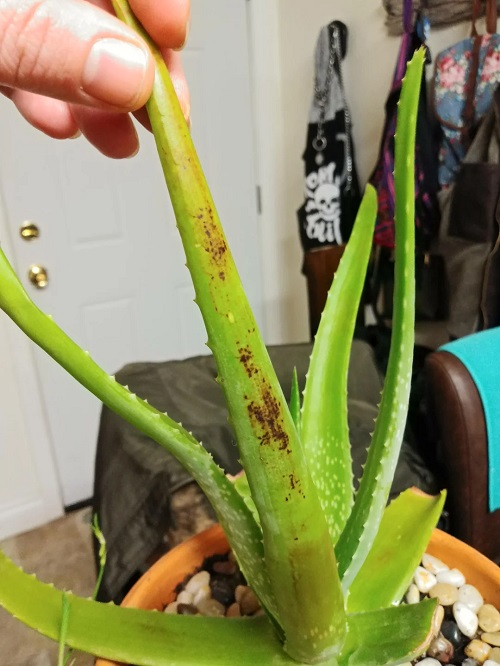
Fifth reason behind aloe plant turning brown are the pests. Aloe plants can be susceptible to fungal infections, mealybugs, or scale insects. These can cause browning, spots, or discoloration on the leaves. Solutions include:
- Inspect the plant regularly for signs of pests or diseases.
- Treat any infestations with appropriate organic or chemical remedies, following the instructions carefully.
- If the plant is severely affected, it may be necessary to prune or remove damaged leaves.
Check 10 Amazing Aloe Vera Benefits Proven In Studies here
6. Nutrient Deficiencies
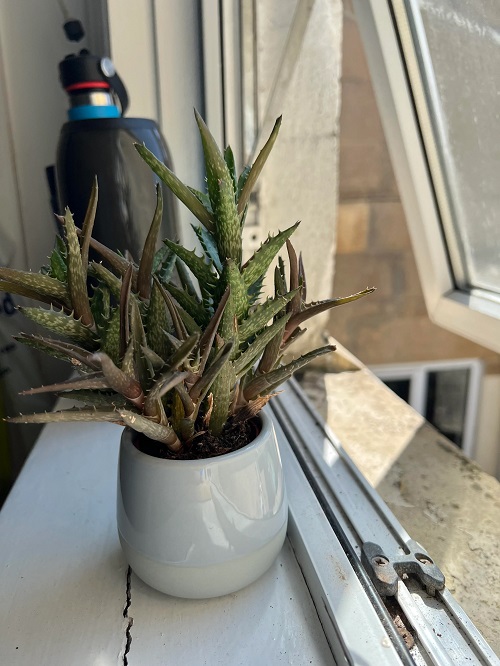
Inadequate nutrients, particularly nitrogen, can cause aloe plants to develop brown or discolored leaves. Solutions include:
- Use a balanced, water-soluble fertilizer specifically formulated for succulents or cacti.
- Follow the recommended dosage and application frequency.
- Ensure the soil is well-draining and of good quality.
7. Root Bound
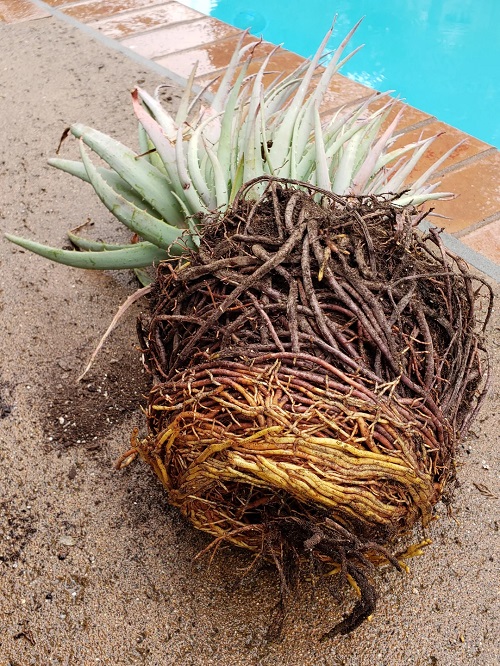
The last reason behind aloe plant turning brown is it getting in a root bound state. In such a condition, the roots of the aloe plant have limited space to grow.
As a result, they may become tangled and compacted, which hinders their ability to take up water and nutrients effectively. This can lead to dehydration and nutrient deficiencies, causing the leaves to turn brown.
- Transplant the aloe plant into a larger pot that provides ample space for the roots to grow and expand. Choose a pot with holes at the bottom to ensure proper water drainage
- Gently loosen the compacted roots during repotting to promote healthy growth. This can be done by carefully teasing out the roots or making small vertical cuts on the outer edges of the rootball.
- Use a well-draining potting mix made specifically for succulents or cacti. The soil should allow excess water to flow out easily, preventing waterlogged conditions.

